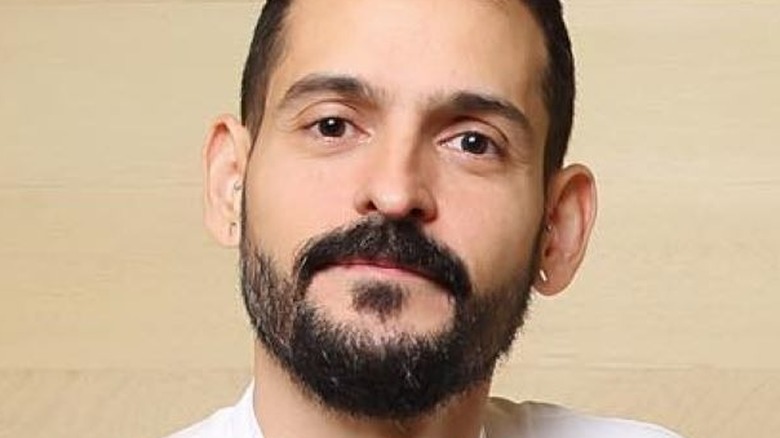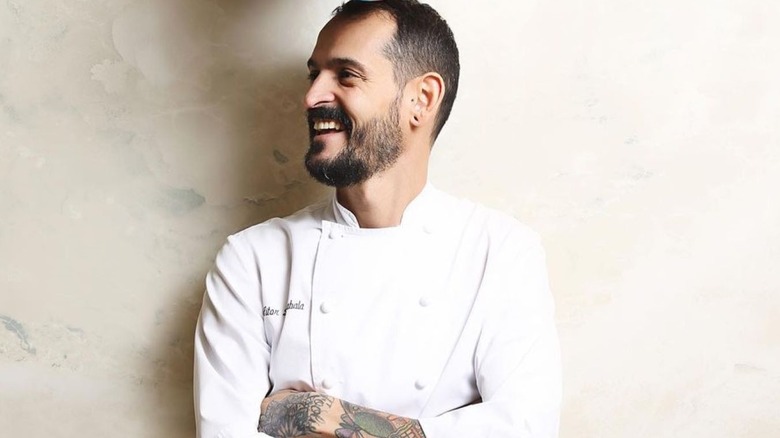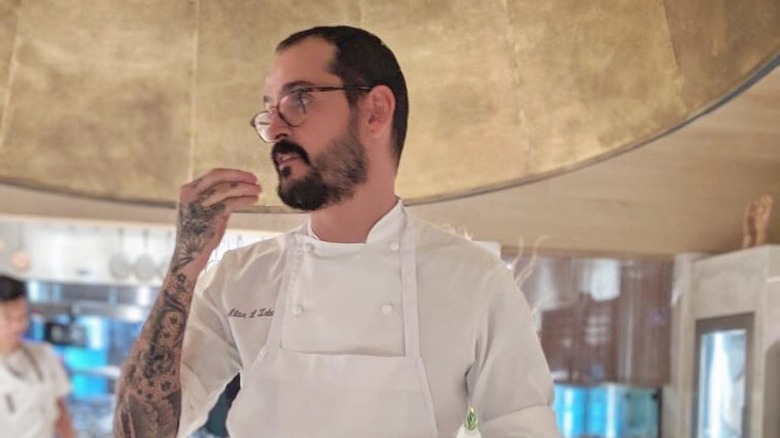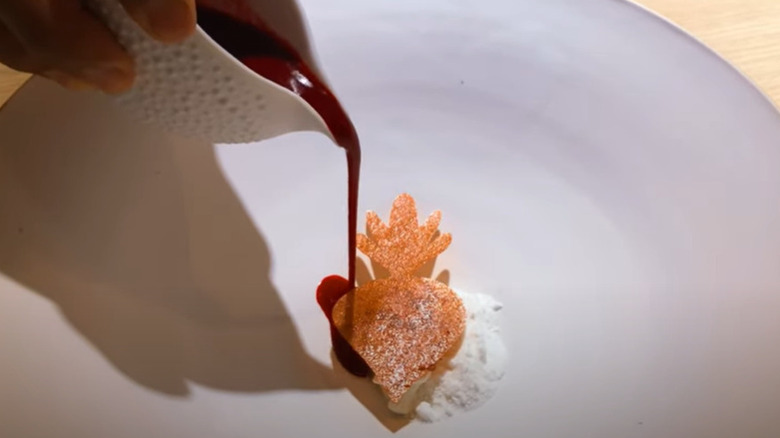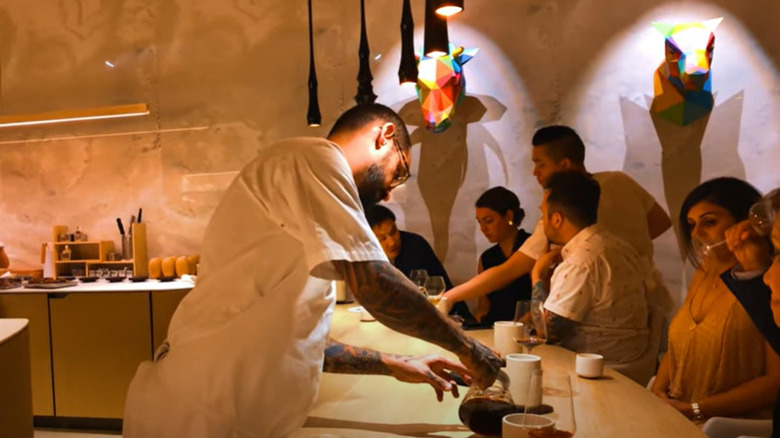The Untold Truth Of Aitor Zabala
Aitor Zabala grew up as a young boy from a Basque family in Barcelona, Spain (via Voyage LA). Since deciding he wanted to become a chef in his teens, Zabala has worked in a myriad of award-winning restaurants, including Abac, Alkimia, and El Bulli in Spain and E, The Bazaar, Saam, and Somni in the United States.
While Zabala is talented in his own right, his connection with José Andrés, the owner of ThinkFoodGroup, really jump-started Zabala's career. After moving to the United States in 2010 to work under Andrés, the two men worked side-by-side to create a new wave in the North American culinary scene. Together, the pair most recently created Somni, an intimate molecular gastronomy dining experience in Los Angeles. According to Eater, the restaurant is no longer in business, but it put Zabala on the map and earned him two Michelin stars.
Zabala's journey to becoming a chef demonstrates his character, worth ethic, and dedication to creating superb dishes and experiences for the diners he serves.
Aitor Zabala learned to cook in the army
When Aitor Zabala was a child, both his mother and grandmother owned restaurants, but his mother didn't allow him in the kitchen, per Voyage LA. Despite growing up around food and having a passion for it, he didn't learn to cook until he joined the army as a teenager. It was mandatory in Spain to spend one year in the army and Zabala was assigned kitchen duty. During this time, he fell in love with the craft and decided to dedicate his career to it. "When I returned home from service, I had only one thought in my mind: go to culinary school and become a cook," Zabala told Four Magazine.
Before Zabala enrolled in culinary school, he had to ask his mother and grandmother for permission. "In Basque Country, the matriarchy is a powerful thing — the women control everything," he told Voyage LA. Upon receiving their approval, Zabala was off and running in the direction of becoming a bonafide chef.
Aitor Zabala struggled to get where he is
Aitor Zabala worked without pay for six months at his first high-profile restaurant job at the three-Michelin-starred Akelarre (via Voyage LA). Zabala's end game in this endeavor was to get the chef, who originally told him he had too little experience, to hire him. It wasn't easy, but eventually, the chef saw Zabala's merits and took him on as a paid employee.
Zabala has gone through the financial challenges of working in a restaurant but also experienced the physical, mental, and emotional toll it can take on a cook. Nevertheless, he says the payoff — feeding people and watching them enjoy your meals — is all worth it.
"Being a chef there are always a lot of struggles — money, family, friends, timing, everything, relationships — you spend so many hours in the kitchen," Zabala told Voyage LA. "This industry is painful. You are working so many hours, handling a million problems — your own plus the restaurant. What they pay you is less than what you give it. But you do this because you love to make people happy through your work."
Aitor Zabala's restaurant Somni was a dream
Literally, somni translates from Catalan as dream, and that's exactly how Los Angeles Times food critic Bill Addison described this magnificent restaurant of the same name where Zabala served as the chef (via Eater). Addison recognized the wonder of the overall dining experience, saying, "The Somni experience is a tightly scripted, directed, and choreographed performance; an acting coach trained the opening team." As for the menu, Addison was equally impressed, eloquently stating that it "blurs the line between whimsy and academia, between applied theory and cheeky cleverness."
Four Magazine described the restaurant physically, noting the lack of sharp edges, the dome-like shape, pops of color from artwork by a pop-surrealist, and, of course, the ten-seat counter that curves around the open kitchen.
Unfortunately, the magical, awe-inspiring restaurant was only open for a little over two years and closed in 2020 after its contract was terminated over an alleged dispute with the owner and was part of a larger wave of Los Angeles-based restaurants closing during the COVID-19 pandemic, according to LA Eater.
Somni was a high point of Aitor Zabala's career
Somni wasn't the first restaurant where Aitor Zabala was the head chef. According to Four Magazine, Zabala previously served as chef at another of José Andrés' restaurants, Saam, but the experience couldn't hold a candle to Somni. Zabala and his team served their ten guests a 25-course tasting menu inspired by both Spanish and Californian cuisines, as well as the staff's own culinary inspirations. Menu items included truffle-infused caviar and stewed pig's tail bun (via World's 50 Best). He hoped diners left having had an interactive and educational meal worth remembering.
"The idea of the restaurant is to give the guest an overall experience where they can interact, and not only fill your stomachs but fill your head with ideas," Zabala told Voyage LA. "Maybe you leave the restaurant knowing something more. People have a good time, and we feed them well, but they leave with something else — knowledge. For example, we educate them throughout the meal about the ingredients, techniques, and everything they are experiencing."
Aitor Zabala bought dishes at this surprising store
Creative culinary concoctions are often complimented by equally creative plating techniques, and, in high-end restaurants, often on very expensive dishware. Many of Somni's dishes were high-end products, but Zabala embraces a minimalist aesthetic when it comes to plates (via Food & Wine). At Somni, for example, the mole was served in cement bowls.
This style is often less expensive. Zabala recalls that when they were opening one restaurant, money was tight and a trip to Bed Bath & Beyond was in order. "I bought everything on sale at Bed Bath & Beyond ... I did it because it was super cheap, but they were perfect vessels for the food we were doing at the time," Zabala recalled in Food & Wine. "I remember for five dollars, I bought like 36 soap holders made of glass. Blue. It was beautiful! ... I remember that we were serving cones in toothbrush holders, and they were perfect. Everybody was like, 'Wow, who made these for you?' Everything that surrounds you is a vessel to serve something."
